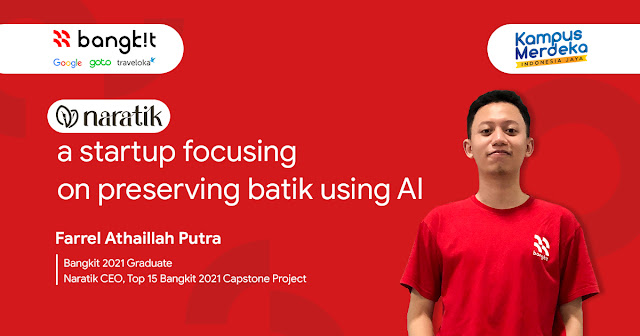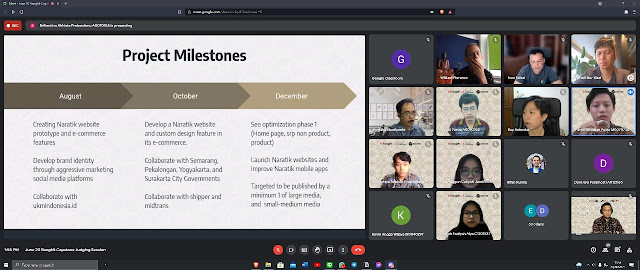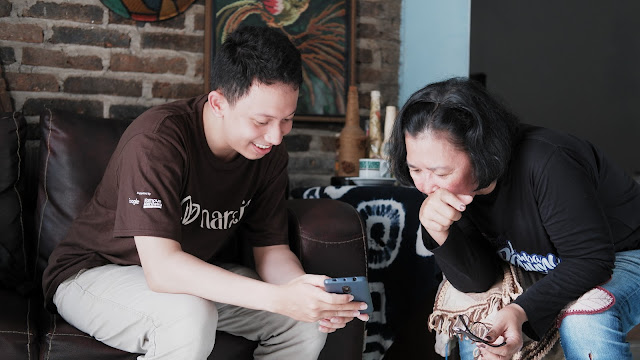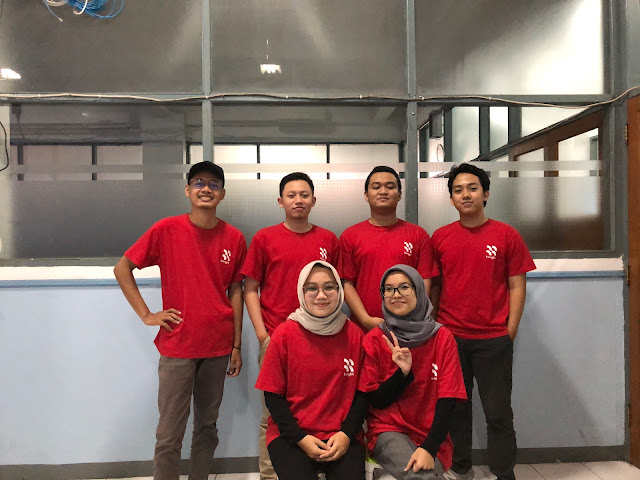Naratik: AI-based Innovation to Preserve Indonesian Cultural Heritage
A story from Farrel Athaillah Putra, Bangkit 2021 Graduate
“Batik export value declines 31.3% in 2020.”
(Ministry of Industry, 2021)
The data presented by the Ministry of Industry above shows that the batik industry in Indonesia is not doing well. This caught Farrel Athaillah Putra (22) and his friends’ attention who are both involved in Bangkit 2021 capstone project. Farrel is leading his team to contribute to Indonesia through their technical skills by creating an application that can strengthen the ecosystem of the batik industry in Indonesia, called Naratik.
Machine Learning in Farrel’s Eyes: A Combination of Business, Research and Technology
“We are carrying out business cooperation with batik home industries and planning to hold an auction of ancient batik in February. Now, the curation process is in progress.”The progress that Farrel and his team made in developing this prospective startup didn’t prevent him from getting another job offer. He was offered an internship position at Metrodata while keeping himself active in an on-going website project on campus.
His interest in IT and his desire to go deeper into Machine Learning are the reason why Farrel is running lots of activities simultaneously. In his opinion, the information and technology sector, particularly Machine Learning, is something that is enticing to explore. Moreover, Farrel admitted that he likes computational lessons and that skill is needed if someone wants to learn Machine Learning.
In Farrel’s Eyes, Machine Learning is a combination of business, research and technology. Therefore, the presence of Machine Learning as one of three offered learning paths in Bangkit made Farrel encouraged to sign himself up as a Bangkit cohort last year. Farrel wants to be someone who’s expert in Machine Learning and Data Science.
Bangkit also captivated Farrel, because of the existence of soft skill classes, global certifications and incubation funds for the best 15 capstone projects. It made Bangkit an educational program that comes with a whole package for Farrel. This program encouraged students to elevate their technical skills to earn global recognition, hone soft skills and make a breakthrough in the world of technology. In Farrel’s opinion, knowledge he got in Bangkit is something that he couldn’t get on campus.
How Bangkit Transformed Farrel
“Yes, I did face some challenges in Bangkit. But I didn’t see it as a difficulty. I saw it as an opportunity to grow bigger and learn more.”There were many advantages that Farrel got from Bangkit, such as credit conversions, professional relations, real industrial experience and better self transformation. As a student with tight schedules, Bangkit trained Farrel to be able to manage time, because the cohorts must get used to having full activities when they get involved in Bangkit.
In terms of soft skills, Farrel also felt a change in him. This program taught him how to give feedback properly to colleagues, to influence people with his view, to express opinion and to be a good leader who works well with team members. His English skills also improved and he said that he became someone who could have English conversation fluently.
From the Family of Batik Maker to Indonesian Heritage Preserver
This happens because not many people know the high value of batik products, especially the ones who’s produced in a traditional way. Business and operations that run traditionally have also contributed to the decline in the batik industry’s turnover. In addition, consumers also have difficulty distinguishing between written batik, stamped and printed batik, so that many doubt the high price of batik.
Therefore, Farrel and his team created Naratik, an end-to-end Batik platform. This app eases users to know the batik making process and will be developed to be able to classify various types of batik, such as written batik, stamped batik and printed batik. The classification feature is expected to educate and regenerate consumer’s trust in the authenticity of batik’s type they see.
Furthermore, Naratik also has a goal to prosper the batik makers in Indonesia, by bridging the consumer with the prospective batik artist. The well-maintained ecosystem of the batik industry can create a new generation of batik makers and preserve Indonesian cultural heritage.
In making his way to reach the goal that he and his friends set for Naratik, Farrel also must face trouble. He was confused about making the right business model for Naratik once. Fortunately, Bangkit equipped Farrel’s team with a mentor where they could discuss this issue. As a result, Naratik managed to be one of the best 15 capstone projects that got incubation funds from Google and the Ministry of Education, Culture, Research and Technology. Farrel admitted that the process of business model creation racked his brains, since he and his friends are all still students.
The other challenge Farrel had to deal with was trying to synchronize the time he and his friends have, since all the Naratik’s team members are still in college. It pushed Farrel to create a Standard Operating System and working hours for his team. He also needed to set weekly meetings to make sure that the coordination is going well.
Dream Big, Start Small
Farrel and his team set their hopes high for Naratik. After managing to collaborate with some Batik home industries from Pekalongan, Yogyakarta, Solo and Semarang, they hope Naratik could be a proper bridge for batik makers from various regions in Indonesia with their customers. Making batik go international also became one of the Naratik team’s goals. As the CEO, Farrel said that indeed, he is a leader with many dreams.
“The steps that must be taken to realize this dream are certainly long. But it's not a dream if it's something too easy for us to achieve. Dream big and start making it true by taking small steps.”Consistency is the value of life that Farrel holds. By continuing to make progress, all the challenges he faces will become opportunities for him to be stronger and to stand on his own feet.
Closing his story about building Naratik, Farrel said that Bangkit is an opportunity that shouldn’t be missed. It can give the cohorts a positive influence in learning how to solve problems, cooperate with others, build a business and make breakthroughs. Farrel guaranteed that after participating in Bangkit, students will become innovative individuals with ideas that can inspire others.
Ready to make small steps to live your big dream with Bangkit?
More stories about Bangkit alumni:









Comments
Post a Comment